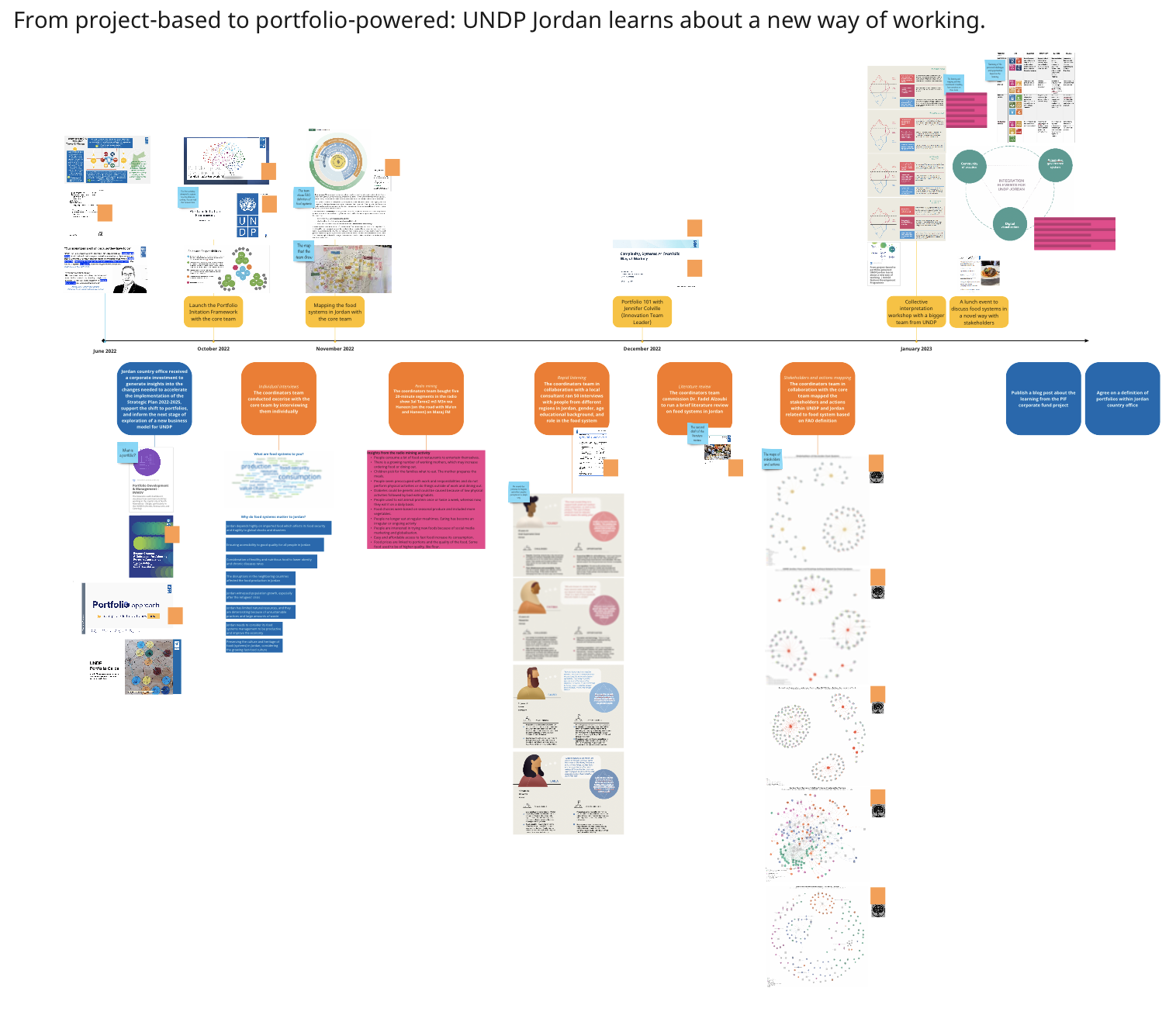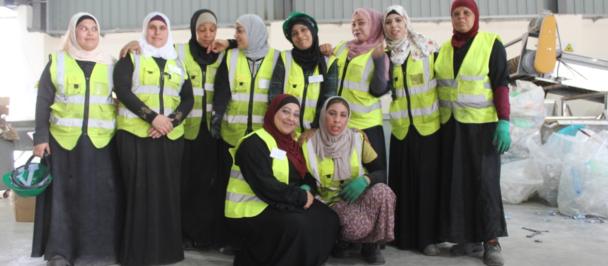From project-based to portfolio-powered: UNDP Jordan learns new ways of working II
March 9, 2023
UNDP Jordan country office has been on a mission to transform how we approach complex development problems. Therefore, we were one of 15 offices that received a global corporate investment under the Portfolio Initiation Framework (PIF), dedicated to learning and building the capacity to design portfolios. Between September 2022 and February 2023, we completed the first phase of developing a portfolio, during which we finished an initial problem scoping (UNDP, 2022)1. This blog post summarises three key learnings from the process.

UNDP Jordan PIF journey timeline
UNDP Jordan picked the “food system” as a theme because of its frequent appearance in news reports, government statements, and public discourse. We consciously chose a food system portfolio, a previously uncharted territory. Our goal was to maximise learning by exploring unrealised connections.

Make it concrete.
“No one knows what a portfolio looks like” was the PIF coordination team's answer to the country office as everyone wondered how an ‘innovation portfolio’ differs from earlier concepts of portfolios introduced to UNDP. While innovation teams are more comfortable embracing ambiguity, it is essential to avoid pushing the teams to a conceptual framework without providing concrete examples and definitions of portfolios. Ambiguity, in this case, could trigger fear of change rather than inspire it, especially if a precedent transition may have left the teams in doubt about change management, like in the case of clustering. We found that it is better to contextualise the portfolio approach in the existing work of UNDP. There are resources with tangible knowledge, like UNDP Portfolio Cards, which showcase how 40 country offices designed their portfolios. Portfolios are meant to address complex systems. Therefore, the clearer and more concrete our process to create a portfolio, the higher the chances to facilitate understanding, buyin from all teams, and reassurance. For example, the coordination team interviewed members from the country office individually. These interviews were productive because they allowed the team members to share their ideas, thoughts, and feelings openly.

In October 2022, the core team answered what the food system means to them. We put their answers in a word cloud to identify patterns in their answers.
PIF core team mapping the food system in Jordan in November 2022.
Keep it hands-on!
Needless to say, effective communication and engagement between the PIF coordination and country office teams are crucial. Activities that bring everyone to work together should be deliberate, planned, and honoured by all. It is worth investing in tools that provide enough interactions between teams to review materials and provide their input. One of the tools we found successful in communicating information and collecting feedback was digital visualisation. We used the Kumu platform to map stakeholders and actions within the food system in Jordan to identify gaps and explore opportunities. The PIF coordination team needs to be mindful of becoming overly directive or imposing in their approach. The six-month duration of the PIF project caused the coordination team to unintentionally focus on the topic of the portfolio rather than engaging with the country office teams. While focusing on the portfolio topic is essential, it is worthwhile for the coordination and the country office to take advantage of the PIF to tackle dynamics that usually promote ad-hoc collaboration and tendencies to retrofit interventions to portfolios
The UNDP team reviewed the stakeholders and actions mapping and deep listening results in a sensemaking workshop in January 2023.
The local chef Karmah Tabaa and Imago designed a lunch attended by actors in the food system. The lunch menu encouraged reflection on the change needed for a fairer and more accessible food system in Jordan.

Samples of the deep listening analysis results in the form of personas and narrative cards.
It is a mindset!
The shift to portfolios is inevitable. For such a shift to fulfil its purpose and produce an impactful change in the systems, dynamic management within UNDP to capture learnings requires breaking out from the silos that revolve around expertise and best practices. Therefore, we recommend mapping capacities within the country office to evaluate what is needed to empower people with the time and freedom to explore new ideas and initiatives, ensure adequate staffing, and delegate responsibilities. We started to explore a few options, like adaptive leadership, organisational psychology, and soft skills training. We also took steps to break out of this expertise thinking. Following PIF, we mapped UNDP’s projects and pipelines against the 2023-2027 Country Programme Document (CPD) priorities. One may think that this exercise is ‘retrofitting’ the projects and pipelines. However, it goes beyond that as we discuss the logic behind these projects and pipelines, how we could build a portfolio of experiments out of them and how to evolve them over time. Unfortunately, a portfolio mindset is limited by the UNDP paradox between deliverydriven and discovery-driven management. This paradox is a significant challenge for our country office teams, who are eager to pursue new ways of working but simultaneously constrained by the reality of day-to-day work.

Jordan country office meetings to expand the PIF process to the CPD priorities in February and March 2023.

The coordination team conducted follow-up interviews with the country office team to evaluate their experience with PIF. Their answers contributed to this blog post.
Moving forward
We have not yet designed a portfolio on food systems. However, PIF encouraged us to expand our experience to reframe how we operationalise our CPD and design interventions. We are finalising our intent for the food system portfolio for the next steps before we embark on the co-creation phase. Designing a portfolio around any development challenge presents an opportunity for a transformative change that can positively impact systems, community, prosperity, and sustainability. The approach necessitates taking a bird’s-eye-view of the entire system instead of perpetuating the cycle of project-focused tunnel vision.
For a complete walkthrough of our journey, please visit this Miro board that outlines all activities and outputs from each one. The board is interactive and has files that can be navigated through.
This blog post was written by the PIF coordination team: Abdullah Al Bostaji, Ayah Younis, Danakhan Malhas, Mohammad Abumughli, Rabia Hasan, and Ru’a Alabweh.
Read more about our journey with PIF.

 Locations
Locations